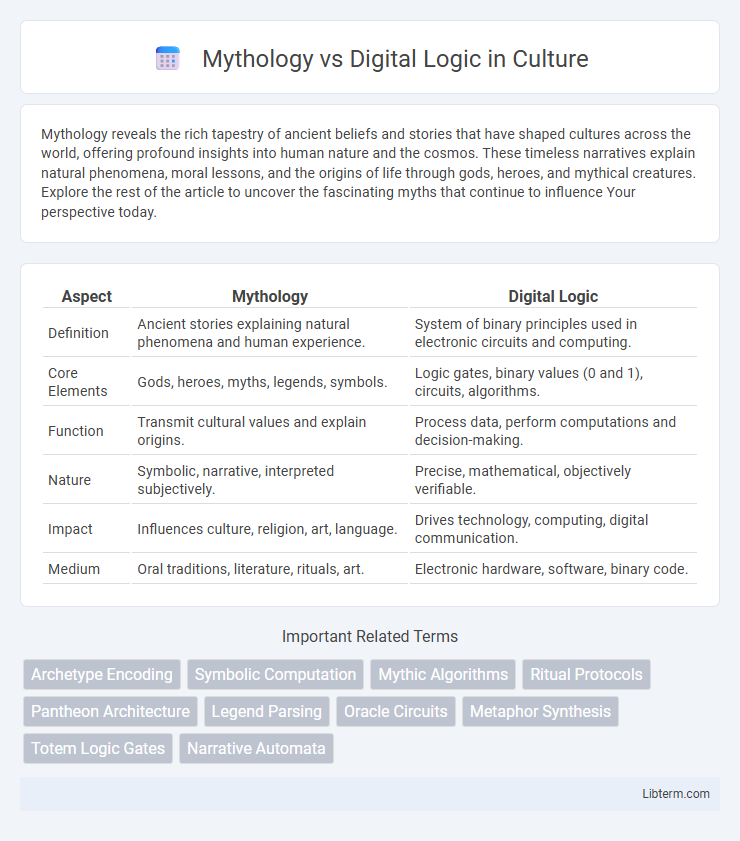Mythology reveals the rich tapestry of ancient beliefs and stories that have shaped cultures across the world, offering profound insights into human nature and the cosmos. These timeless narratives explain natural phenomena, moral lessons, and the origins of life through gods, heroes, and mythical creatures. Explore the rest of the article to uncover the fascinating myths that continue to influence Your perspective today.
Table of Comparison
| Aspect | Mythology | Digital Logic |
|---|---|---|
| Definition | Ancient stories explaining natural phenomena and human experience. | System of binary principles used in electronic circuits and computing. |
| Core Elements | Gods, heroes, myths, legends, symbols. | Logic gates, binary values (0 and 1), circuits, algorithms. |
| Function | Transmit cultural values and explain origins. | Process data, perform computations and decision-making. |
| Nature | Symbolic, narrative, interpreted subjectively. | Precise, mathematical, objectively verifiable. |
| Impact | Influences culture, religion, art, language. | Drives technology, computing, digital communication. |
| Medium | Oral traditions, literature, rituals, art. | Electronic hardware, software, binary code. |
Introduction: Bridging Mythology and Digital Logic
Mythology and digital logic converge through symbolic representation, where ancient narratives and modern binary systems both encode complex meanings into simplified forms. Exploring the archetypes and patterns in mythology reveals parallels to logic gates and circuits that process information in computing. This interdisciplinary approach enhances understanding of how humans interpret and structure knowledge across time and technology.
Origins: Ancient Tales vs Modern Algorithms
Mythology originates from ancient tales passed down through oral traditions, embodying cultural beliefs and explaining natural phenomena through gods and heroes. Digital logic, by contrast, stems from modern algorithms developed in the 20th century, underpinning computational systems through binary states and Boolean algebra. While mythology reflects human attempts to make sense of the world mythopoetically, digital logic provides precise, mathematically grounded frameworks driving contemporary technology.
Symbolism: Archetypes and Binary Codes
Symbolism in mythology centers on archetypes, such as heroes, tricksters, and gods, representing universal human experiences and psychological patterns. Digital logic employs binary codes, using combinations of 0s and 1s to symbolize data and instructions, forming the foundational language of computing systems. Both archetypes and binary codes function as symbolic frameworks for interpreting complex information, bridging human cognition and machine processing.
Storytelling: Narratives in Myth and Circuit Design
Mythology uses rich narratives that convey cultural values and explain natural phenomena through gods, heroes, and symbolic events, forming timeless stories passed down generations. In digital logic, storytelling emerges in circuit design where logical gates and sequential elements narrate data flow and system behavior, creating functional sequences within hardware. Both domains rely on structured storytelling to organize complex information--mythology through symbolic tales, digital logic through ordered signal processing and state transitions.
Logic Structures: Mythic Patterns and Logic Gates
Mythology employs mythic patterns that mirror human reasoning through archetypal narratives and symbolic logic, while digital logic relies on logic gates such as AND, OR, and NOT to process binary data. Both systems structure information flow, with mythic patterns embodying conditional sequences found in storytelling and logic gates executing precise Boolean functions in computing. Understanding the parallels between mythic narrative logic and digital gate operations can enhance interdisciplinary approaches to cognitive frameworks and information processing.
Interpretation: Metaphor vs Literal Computation
Mythology uses rich metaphors to convey cultural values and human experiences through symbolic narratives, while digital logic relies on literal computation with binary states to execute precise operations in hardware and software systems. The interpretative nature of mythology invites diverse meanings and subjective understanding, contrasting sharply with the deterministic and unambiguous processing of digital logic circuits and algorithms. This fundamental difference highlights how mythology interprets reality symbolically, whereas digital logic models reality through exact mathematical and logical rules.
Influence: Mythology’s Legacy in Tech Culture
Mythology's rich symbolism and archetypes profoundly influence tech culture, inspiring names, narratives, and ethical frameworks in digital logic and AI development. Tech companies frequently adopt mythological motifs, such as naming programming languages or software after gods and legendary figures, fostering a cultural resonance that shapes innovation mindset. This enduring legacy bridges ancient storytelling with modern computational logic, reinforcing creativity and human-centric design in technology.
Human Understanding: Intuition vs Precision
Mythology shapes human understanding through intuition, conveying complex ideas via symbolic narratives and archetypes that resonate with collective unconscious. Digital logic, grounded in precise binary operations and algorithmic structures, enables exact computation and decision-making without ambiguity. The contrast highlights how intuition fosters holistic meaning, while precision drives clarity and predictability in processing information.
Education: Teaching Through Myths and Logic Models
Teaching through myths engages students by leveraging narrative structures found in various mythologies, fostering critical thinking and cultural awareness in education. Digital logic models provide a structured, computational framework that aids learners in understanding fundamental principles of computer science and engineering. Combining mythological storytelling with digital logic concepts enhances cognitive retention, making abstract technical content more accessible and relatable.
Conclusion: Harmonizing Ancient Wisdom and Digital Thought
Mythology and digital logic converge in their shared role of structuring human understanding--mythology through symbolic narratives that explain existence, digital logic through binary frameworks powering modern computation. Integrating mythological insights with digital logic fosters innovative perspectives, enhancing artificial intelligence with ethical and cultural depth. Harmonizing ancient wisdom and digital thought creates a holistic approach that bridges timeless human values with technological advancement.
Mythology Infographic

 libterm.com
libterm.com